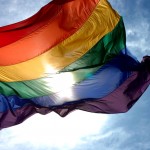

When Russian cities started banning Pride marches, LGBTQ+ rights activist Mikhail Tumasov took to the internet to make sure his organisation kept its voice. But state authorities were quick to catch up.
Tumasov said the country’s internet regulator had tried repeatedly to shut down his group’s website under the terms of Russia’s 2013 “anti-gay propaganda” law, which bans the dissemination of LGBTQ+ information to children.
So far, his organisation – the Russian LGBT Network – has been able to challenge the shutdowns in the courts.
“Somehow we succeeded,” Tumasov said.
“So our website is still up and our social profiles are still up. But not everyone is so successful,” he told the Thomson Reuters Foundation by phone.
According to a major global report published this week by three rights organisations, 32 different LGBTQ+ websites were blocked at least once on Russian internet providers between mid-2016 and mid-2020.
“News websites on LGBTIQ-related topics were most commonly blocked, followed by cultural and human rights sites,” said the report published by OutRight Action International, the University of Toronto’s Citizen Lab and the Open Observatory of Network Interference (OONI).
Same-sex relations in Russia are legal, but attitudes about sexuality and gender identity remain conservative for the most part.
In a 2020 referendum, voters backed an amendment to the constitution to allow marriage only between a man and a woman – effectively closing the door on potential future legislation in favour of same-sex weddings.
“Governments filter LGBTIQ websites using a variety of methods, but typically consisting of legal and technical methods,” said Irene Poetranto, senior researcher at the Citizen Lab tech human rights group and one of the report’s co-authors.
These can include passing laws that restrict “pornography” as well as specifically targeted anti-LGBT+ legislation, Poetranto said in emailed comments.
“For example, in Russia, the anti-gay propaganda law was enacted supposedly to protect children/minors and thus, LGBTIQ website censorship is conducted for the same reason.”
Russia’s internet regulator Roskomnadzor did not immediately respond to an emailed request for comment.
The post Banned and blocked: LGBTQ+ websites censored from Russia to Indonesia appeared first on GAY TIMES.
Banned and blocked: LGBTQ+ websites censored from Russia to Indonesia

When Russian cities started banning Pride marches, LGBTQ+ rights activist Mikhail Tumasov took to the internet to make sure his organisation kept its voice. But state authorities were quick to catch up.
Tumasov said the country’s internet regulator had tried repeatedly to shut down his group’s website under the terms of Russia’s 2013 “anti-gay propaganda” law, which bans the dissemination of LGBTQ+ information to children.
So far, his organisation – the Russian LGBT Network – has been able to challenge the shutdowns in the courts.
“Somehow we succeeded,” Tumasov said.
“So our website is still up and our social profiles are still up. But not everyone is so successful,” he told the Thomson Reuters Foundation by phone.
According to a major global report published this week by three rights organisations, 32 different LGBTQ+ websites were blocked at least once on Russian internet providers between mid-2016 and mid-2020.
“News websites on LGBTIQ-related topics were most commonly blocked, followed by cultural and human rights sites,” said the report published by OutRight Action International, the University of Toronto’s Citizen Lab and the Open Observatory of Network Interference (OONI).
Same-sex relations in Russia are legal, but attitudes about sexuality and gender identity remain conservative for the most part.
In a 2020 referendum, voters backed an amendment to the constitution to allow marriage only between a man and a woman – effectively closing the door on potential future legislation in favour of same-sex weddings.
“Governments filter LGBTIQ websites using a variety of methods, but typically consisting of legal and technical methods,” said Irene Poetranto, senior researcher at the Citizen Lab tech human rights group and one of the report’s co-authors.
These can include passing laws that restrict “pornography” as well as specifically targeted anti-LGBT+ legislation, Poetranto said in emailed comments.
“For example, in Russia, the anti-gay propaganda law was enacted supposedly to protect children/minors and thus, LGBTIQ website censorship is conducted for the same reason.”
Russia’s internet regulator Roskomnadzor did not immediately respond to an emailed request for comment.
The post Banned and blocked: LGBTQ+ websites censored from Russia to Indonesia appeared first on GAY TIMES.


Post a Comment